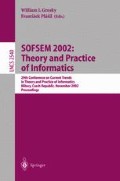Abstract
Possibility theory has been developed in the last twenty years, mainly as a framework for modelling states of partial ignorance on the basis of possibility distributions encoding complete pre-orders. Possibility measures of events, defined as the maximum of the distribution over the set of models of the considered events, together with the dual measures of necessity, are then used for assessing uncertainty. As such, possibility theory relies on a minimal specificity principle which states that the possibility level associated to a possible world should be the largest one which is compatible with the constraints representing the available information. It agrees in particular with the classical view of logical modelling according to which each piece of information declares some worlds impossible (the other worlds forming a subset of tentatively possible ones). When pieces of information are conjunctively combined, the resulting set of the possible worlds is indeed the largest set compatible with all pieces of information. Possibility theory extends this view by allowing intermediary levels between what is fully possible and what is completely impossible.
Access this chapter
Tax calculation will be finalised at checkout
Purchases are for personal use only
Preview
Unable to display preview. Download preview PDF.
References
S. Benferhat, D. Dubois, S. Kaci, and H. Prade. Bipolar possibilistic representations. In 18th International Conference on Uncertainty in Artifcial Intelligence (UAI’02), pages 45–52, 2002. 169
S. Benferhat, D. Dubois, S. Kaci, and H. Prade. Bipolar representation and fusion of preferences in the possibilistic logic framework. In Proceedings of the 8th International Confenrence on Principle of Knowledge Representation and Reasoning (KR’02), pages 158–169, 2002. 169
D. Dubois, P. Hájek, and H. Prade. Knowledge-driven versus data-driven logics. Journal of Logic, Language, and Information, 9:65–89, 2000. 168, 171
D. Dubois, H. Prade, and P. Smets. “Not impossible” vs. “guaranteed possible” in fusion and revision. In 6th European Conference on Symbolic and Quantitative Approaches to Reasoning and Uncertainty (ECSQARU’01), Toulouse, pages 522–531. LNAI 2143, Springer Verlag, 2001. 169
D. Dubois, H. Prade, and L. Ughetto. A new perspective on reasoning with fuzzy rules. In “Advances in Soft Computing”, Proceedings of the 2002 AFSS International Conference on Fuzzy Systems, Calcutta, India, N.R. Pal, M. Sugeno (Eds.), pages 1–11. LNAI 2275, Springer Verlag, 2002
Author information
Authors and Affiliations
Editor information
Editors and Affiliations
Rights and permissions
Copyright information
© 2002 Springer-Verlag Berlin Heidelberg
About this paper
Cite this paper
Dubois, D., Prade, H. (2002). Bipolarity in Possibilistic Logic and Fuzzy Rules (Extended Abstract). In: Grosky, W.I., Plášil, F. (eds) SOFSEM 2002: Theory and Practice of Informatics. SOFSEM 2002. Lecture Notes in Computer Science, vol 2540. Springer, Berlin, Heidelberg. https://doi.org/10.1007/3-540-36137-5_10
Download citation
DOI: https://doi.org/10.1007/3-540-36137-5_10
Published:
Publisher Name: Springer, Berlin, Heidelberg
Print ISBN: 978-3-540-00145-4
Online ISBN: 978-3-540-36137-4
eBook Packages: Springer Book Archive

